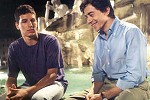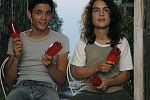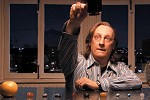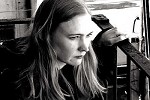 SHADOWS ARTHOUSE FILMS ’05
SHADOWS ARTHOUSE FILMS ’05THE FAR SIDE OF THE MOON | THE TIME WE KILLED
< < M O R E | M O R E > >
last update 4.Apr.05
See also: SHADOWS FILM FESTIVAL | SHORT FILMS
 R E V I E W B Y R I C H C L I N E
R E V I E W B Y R I C H C L I N E
 This warm and involving film about a seriously dysfunctional Italian family gets beneath our skin as we watch a variety of interactions--relationships that are horribly difficult yet utterly essential.
This warm and involving film about a seriously dysfunctional Italian family gets beneath our skin as we watch a variety of interactions--relationships that are horribly difficult yet utterly essential.
The story's told by Chiara (De Crescenzo), a young girl about to receive her first communion, documenting her family on video. There's her busy mother (Ceccarelli), sidelined father (Baliani) and wild-child big sister (Perini); her obsessive widowed Aunt Sara (Buy) and secretive teen cousin (Scianna); and her Uncle Claudio (Lo Cascio), who's terrified that someone will figure out that Luca (Quaglia) is not merely his good friend. And then there's Grandma (Lisi), who doesn't have a clue how to hold this family together.
As Chiara observes, "My relatives are all so strange!" And indeed they are, although their insecurities and passions and stresses are universal. This is a very busy film with lots of characters interacting in just about every conceivable way, looking at every type of family relationship and the awkward combination of joys and strains. The ensemble is extremely well-directed by Comencini; this is a lush-looking film loaded with little asides, fantasies, flashbacks and home movies that fill in all sorts of gaps. And the cast dive into the sharp script with energy and emotion. These are all people who find it difficult to trust others, which is why all of them are harbouring secrets and as a result driving each other away. And yet the cast make them all remarkably sympathetic--we see ourselves in them.
And this is the only reason this film works: despite their considerable flaws, we both like and identify with these people. They are desperately trying to improve their lives, even though most of what they do is completely misguided. Both instinct and fear are to blame for their problems. And even if the film is spread a bit thinly between the characters (there's no central figure we can cling to), it's still sweetly moving and vividly engaging.
scr Cristina Comencini, Lucilla Schiaffino
with Virna Lisi, Margherita Buy, Sandra Ceccarelli, Luigi Lo Cascio, Marco Baliani, Marco Quaglia, Francesco Scianna, Francesca Perini, Maria Luisa De Crescenzo, Andrea Sama, Ricky Tognazzi, Gaia Conforzi
 release Italy 12.Apr.02, UK 1.Apr.05 llgff
release Italy 12.Apr.02, UK 1.Apr.05 llgff02/Italy 1h42

22.Mar.05 llgff
 R E V I E W B Y R I C H C L I N E
R E V I E W B Y R I C H C L I N E
[aka: Cote d’Azur or Mariscos Beach]
 After the thoughtful and provocative Drole de Felix and Ma Vie, French filmmakers Ducastel and Martineau shift into a much more mainstream style with this hugely crowd-pleasing romp, which brilliantly combines two French movie traditions--the holiday drama and the romantic farce.
After the thoughtful and provocative Drole de Felix and Ma Vie, French filmmakers Ducastel and Martineau shift into a much more mainstream style with this hugely crowd-pleasing romp, which brilliantly combines two French movie traditions--the holiday drama and the romantic farce.
Beatrix and Marc (Bruni-Tedeschi and Melki) head off to the Riviera for the summer as usual, with their quiet teen son Charly (Torres) and their independent-minded daughter Laura (Seyvecou), who immediately departs for Portugal with her biker boyfriend. Beatrix and Marc both wonder about Charly's sexuality, especially when his summer friend Martin (Collin) arrives as usual and the two take off for long walks along the coast. But Charly's not the issue here; actually, everyone else is up to something. And not just in the shower.
This film is so jammed with delightful little touches that it keeps a broad smile on our face from start to finish, due to the clever filmmaking, witty script, insightful observations and, mostly, a shimmering performance from Bruni-Tedeschi. She's simply perfect as the lively wife and mother with a wandering mind--hilariously random humour with razor-sharp timing. And she's well-matched by the lively Melki, who's both repressed and out of control at the same time. Newcomers Torres and Collin are terrific, and Barr is superbly cast in a pivotal supporting role as a fateful plumber.
Running gags abound here, as do set pieces that are both hilariously unhinged and jaggedly moving. Ducastel and Martineau have made a very low-budget film that looks like an A-list production, and while distracting us with the on-screen antics they're actually saying something very important about family expectations and real friendship. This is in essence a film about sexuality and repression, and by making the film as a breezy farce they say much more than most mopey-headed French dramas. Even the musical numbers (written by the filmmakers in the style of corny Bardot ditties) are both goofy and telling. This is a thoroughly engaging romp with a little kick. And a lot of heart.
with Valeria Bruni-Tedeschi, Gilbert Melki, Romain Torres, Edouard Collin, Jean-Marc Barr, Jacques Bonnaffé, Sabrina Seyvecou, Yannick Baudin, Sébastien Cormier, Marion Roux
 release France 30.Mar.05, US 9.Sep.05,
release France 30.Mar.05, US 9.Sep.05,UK 14.Apr.06
05/France BAC 1h30
Surprise film:
LONDON L&G FILM FEST
Also: TRIBECA FILM FEST
3.Mar.05 llgff
 R E V I E W B Y R I C H C L I N E
R E V I E W B Y R I C H C L I N E
 Lepage is a seriously inventive filmmaker, but he's far too cerebral for most filmgoers. This surreal examination of life is strikingly visual and thoughtfully moving, and also ponderous and pretentious.
Lepage is a seriously inventive filmmaker, but he's far too cerebral for most filmgoers. This surreal examination of life is strikingly visual and thoughtfully moving, and also ponderous and pretentious.
Phillippe (Lepage) is a rootless middle-aged man who's still in school. The academic community is unwilling to accept PhD thesis, which claims that all space travel is narcissistic. Meanwhile, his vacuous younger brother Andre (Lepage again) seems far too happy with his job as a TV weatherman. Now their mother (Cadieux) has just died after a long illness, apparently severing the tenuous bond between them. As Phillippe tries to sort out the strands of his life, he struggles to make any meaningful sense of it.
Visually, this is clever and enticing work, as Lepage uses recurring imagery (the moon, a goldfish, television screens, washing machines) as Phillippe revisits his past and present. Special effects are both subtle and astonishing, and the camera gets up close to capture hidden recesses of emotion within the characters. But the film is badly lacking in energy, and all of the characters are grumpy, selfish, ignorant brats. This might be a realistic view of life, but it's also cruelly cynical.
As an actor, Lepage is at least intriguing to watch as both characters. With his more superficial charm and relaxed approach to life, Andre is much more likable than the sullen, wishy-washy Phillippe. And the strained relationship between them is honest and raw. The basic notion, obviously, is that these brothers are opposite sides of one man--like the moon has two sides, one we see and one we don't. But honestly, the concept is so obtuse and the film is so morose that it only makes us long for Charlie Kaufman's much more vivid and memorable approach to the same idea in Adaptation.
And it's a bit annoying that the film doesn't grab hold more effectively, because artistically it is a real achievement. Lepage constructs films fluidly, dissolving between scenes in almost imperceptible ways that are clever and extremely skilful while touching on deep themes. This is definitely art. But it's not terribly entertaining.
with Robert Lepage, Anne-Marie Cadieux, Marco Poulin, Érika Gagnon, Gregory Hlady, Richard Fréchette, Céline Bonnier, Lorraine Côté, Sophie Faucher
 release Can 9.Sep.03 tff,
release Can 9.Sep.03 tff,UK 4.Apr.05 llgff,
US 2.Dec.05
03/Canada 1h47

20.Mar.05 llgff
 R E V I E W B Y R I C H C L I N E
R E V I E W B Y R I C H C L I N E
 This extraordinary experimental film almost looks like it was photocopied--the images are high-contrast monochrome and often merely evoke the scene or the emotions in the story rather than explicitly showing us what's going on. It's fascinating, but slightly dull and alienating.
This extraordinary experimental film almost looks like it was photocopied--the images are high-contrast monochrome and often merely evoke the scene or the emotions in the story rather than explicitly showing us what's going on. It's fascinating, but slightly dull and alienating.
The film is a diary of life from November 2002 to April 2003, as told by Robyn (Jarnot), an agoraphobic writer holed up in her New York apartment. As she bashes out a novel on her manual typewriter, she pauses to obsess about her aching fear of going out onto the street, reminisce about her tortured romantic past, eavesdrop on her noisily bickering neighbours, and hark back on the events of 9/11 and the political fallout afterwards.
There are several remarkable things about this film, which feels more like a museum installation than an actual movie. Writer-director Reeves evokes some powerful emotions as Robyn remembers both her past lovers and her suicidal teenage urges, not to mention her agoraphobia. After the 11 September attacks, she comments that "people seemed as frightened as I usually am", and yet the Bush administration's violent, rights-shredding response was even more terrifying to her. As is "the amnesia of the American people". And there's also a lot of deeply affecting internal grappling--emotional, professional, anecdotal.
All of this unfurls in a sleepy, mopey, faux-trendy voiceover that's more than a little affected. It's trying a bit too hard to sound random and rambling, but is actually a carefully composed collection of thoughts, poems, quotations, fiction and stream-of-consciousness. There's some great stuff in here, and a nice sense that the film is both the story of a woman speaking to her dead lover and of a novelist who has, literally, lost the plot. Artful and beautiful, but as a movie it's also rather cold.
with Lisa Jarnot, Valeska Peschke, Susan Arthur, Jeff Acosta, Jennifer Reeves, Rainer Dragon, Jenny Reeves, Joung Yoon Lyon, James Hibler, Nancy Reeves, Joseph Arthur, Carl Lennartson
 release UK 2.Apr.05 llgff
release UK 2.Apr.05 llgff04/US 1h34

22.Mar.05 llgff


See also: SHADOWS FILM FESTIVAL | SHORT FILMS
© 2005 by Rich Cline, Shadows
on the Wall